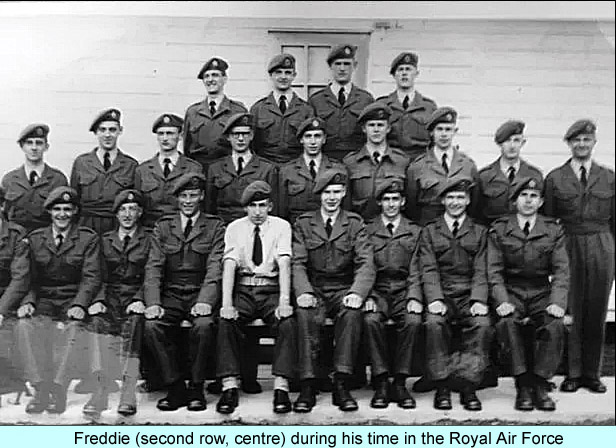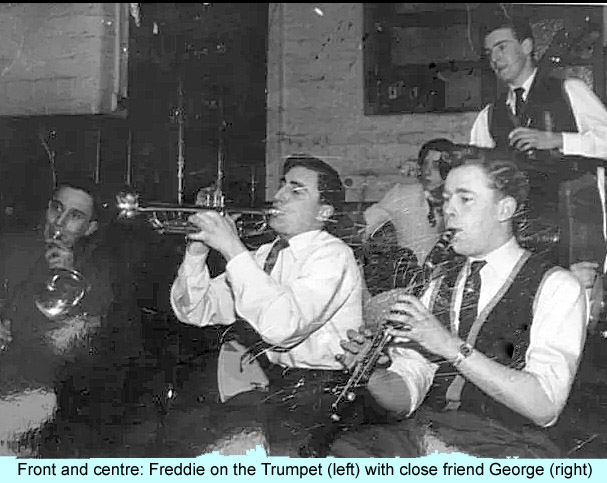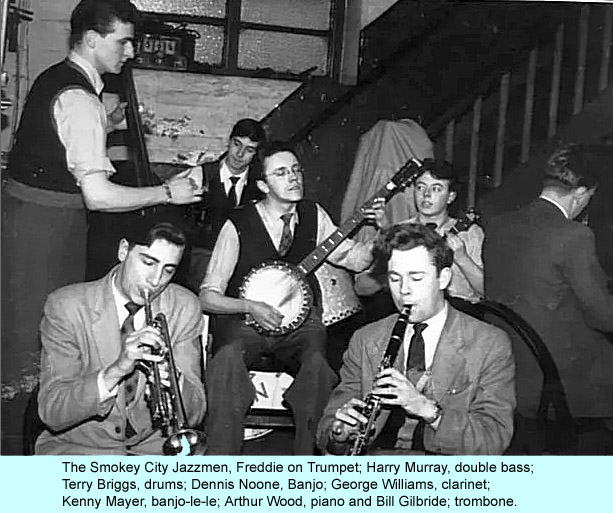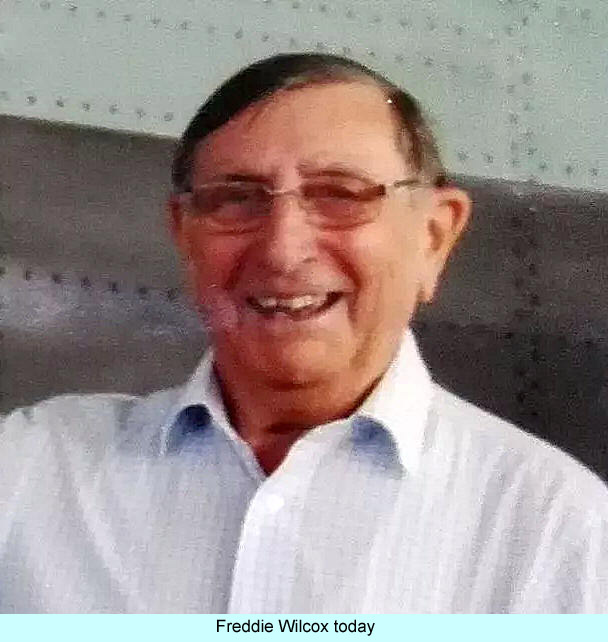|
A lifelong love of jazz lead to
a colourful life growing up in the Potteries By Adam Gratton Nostalgia Writer
Acknowledgement to
stokesentinel.co.uk/
Having spoken to Freddie Wilcox
on a number of occasions about his colourful life growing up in
the Potteries or his time in the RAF, it was talk about his love
of jazz which drew me into finding out more. Having put his
heart and soul into his music, Freddie took me on trip back
through his early days touring the jazz scene of the Potteries.
He said: "As a young teenager and
as a result of my dad acquiring an upright piano, I became
interested and fell in love with the music of that era - the
jive and swing of the 1940s."I recall the very first time I
played the piano in public. It was at a charity evening at Fegg
Hayes church hall. I sat terrified at the piano on a very high
stage.
"I started to play a little number
called 'In The Mood', which was the signature tune of the band
leader Joe Loss and his orchestra. "I got very good applause and
everything felt much more relaxed after that. The tune has stuck
with me all through my life." Having found his feet Freddie,
playing casually for free, found himself being approached for
his talents at the piano." One Saturday evening, although I was
still underage, I went into the Birches Head Hotel," he said.
"In the lounge was an upright piano. I sat down and played for
about an hour, during which time the room had filled up. 'The
then landlord asked me if I would be interested in taking the
job on a permanent basis. "Of course, I was pleased the audience
was listening and I had been offered the position, however I did
not want to be tied down every weekend, so I declined and
thanked him for the offer. After that I did go in on the odd
occasion to play for the love of it. During this time I was also
playing in several other pubs in Hanley, who were interested in
acquiring my services."
Following several years of playing when and where he liked,
Freddie became encapsulated by the sounds of American jazz and a
regular follower of the top local bands leading the way. "In the
early 1950s there was a big revival of New Orleans traditional
jazz music," he said." Bands such as Acker Bilk and his jazz
band, Kenny Ball, Chris Barber and a number of other outfits."
Seeing it was not a whim, Freddie's mother
put her hand in her pocket to help her musical son follow his
passion - a choice she wouldn't regret. "For my 18th birthday my
mum bought me a brand new Selmer trumpet from the Ken Jones
music shop on Hope Street Hanley," Freddie said. "From that
point, I practised every night in the front room of our house on
Hammersley Street. "I must have annoyed the neighbours,
especially when I got a chorus from my Golden Retriever
'Blondie' whenever I hit certain notes. "For Freddie, things
were to take a detour away from his hometown in service of his
country and a musical friendship which would last a lifetime.
George, armed with his clarinet, and me with
my trumpet in a drawstring bag which my mum had made from a pair
of old blackout curtains left over from the war, headed to the
Nottingham Jazz Club. 'The resident band there was Mick Gill and
at the interval, which was about 45 minutes, guest players would
be invited to sit in with some members of the band - which we
did.
"I remember one night after the jazz night we
were on our way back to camp, and as we crossed over Trent
Bridge I stopped to play a muted 'Basin Street Blues'. "My pals
dared me to take the mute off my trumpet. Guess what happened
next? "Flashing blue lights with sirens going 'excuse me sir,
don't you realise you are disturbing the peace'? My pals were
falling about laughing. "At the weekends we
were on duty at Air Traffic Control. In the evenings we would
walk down to our local pub in Bingham. 'There I played a white,
baby grand piano and people sang along. "Recently I went back to
visit that pub again, 65 years later, but alas, the grand piano
was gone. "After our national service, George and I were
demobbed from the RAF on the same day in 1954."
Finding themselves back in the Potteries, Freddie and George
made sure their love of jazz, which had pulled them together,
did not get left behind. We continued to be good friends and
decided to join a group of young musicians," Freddie said. "Not
long after we formed our own jazz band. We called ourselves the
'Smokey City Jazzmen.' "I remember a young and very enthusiastic
banjo player named Dennis Noone*, who had studied New Orleans
traditional jazz music for a number of years.? "He told me
I played trumpet very much in the style of Bunk Johnson, the
famous New Orleans trumpeter. "I can tell you that certainly
boosted my ego a great deal. We based ourselves at Cobridge
Hall, but also played at quite a number of venues in the city."
On Tuesday nights we practised in an upstairs room at the Rose
and Crown pub, close to what now is Festival Park. "Everything
went very well for a couple of years. Problems started to crop
up when George and I both got married and a couple of the lads
were called up for their National Service.
'These changes made the situation very difficult to carry on, so
eventually we disbanded. "With no band, the two friends were
left at a loose end, not knowing which direction to take next.
However their determination to play kept them going, leading
them onto their next chance encounter. Freddie said: "George and
I got ourselves membership to another jazz club, in Waterloo
Road, Burslem, called the Embassy Club. 'The resident band,
which had recently formed and who were a great traditional band,
were called The Ceramic City Stompers'. "Any jazz enthusiast in
the city knew, and knows, how good this band was. "I remember
one of the musicians told me the Embassy Club was owned by
Bevin, who owned an electrical shop in Burslem. "He had assured
them they would be paid for their music once the club's
membership reached. (
"George eventually went on to play for this band on a permanent
basis. I had on occasion sat with the band when their resident
trumpet player, Mel Hill, had to go to university. 'The Embassy
Club eventually closed and the Ceramic City Stompers moved,
temporarily, to the Moorland Road Cafe. "Eventually they found a
permanent venue at the Crown and Anchor pub, under the railway
bridge in Longton. "Sadly my friend George, along with his wife
and two children, had to move out of the area altogether
because of his job. "Over the years we lost touch. The last time
I saw George was some 35 years ago in the Black Horse pub, Endon. "It would be marvellous to meet up again."
* Dennis Noone, who Freddie knew as a banjo player in their
original band, went on to play the trumpet himself and played
for the Ceramic City Stompers in later years. He died some time
ago now. |



